-
Hastie workers axed via SMS Victorian secretary of the Electrical Trades Union (ETU) Dean Mighell said up to 3000 workers at engineering company Hastie Group could lose their jobs, after the company went into administration on May 28. Many workers discovered their fate via text message.
-

Who really runs this country? The announcement by the federal government that it has struck its first Enterprise Migration Agreement with the world's richest woman Gina Rinehart reveals just how eager our governments are to serve the mining millionaires.
-

The 2012 Resistance conference, in Adelaide July 20-22, will feature international guests including from CLASSE in Quebec (the largest and most radical student organisation leading massive student strikes); the Socialist Party of Malaysia (hugely involved in the Bersih democracy uprising); and from the brave Palestinian People's Party.
-
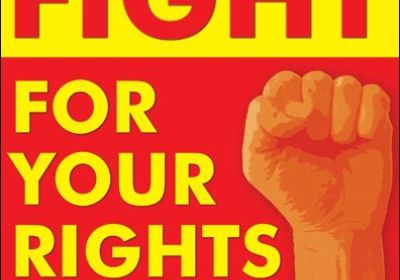 The Socialist Alliance released the statement below on May 29. * * *
The Socialist Alliance released the statement below on May 29. * * *Training for young people and permanent residency for migrant workers: Not the 457 visa rip off!
Socialist Alliance statement May 29, 2012
The announcement by Immigration Minister Chris Bowen on May 25 that the Gillard Labor government has struck its first Enterprise Migration Agreement with mining billionaire Gina Rinehart reveals just how eager this government is to serve the mining millionaires.
-
 Red carpet and champagne marked the start of the first Red-Green Alliance (RGA) congress since the party tripled its mandate at a poll in September last year. The 385 delegates representing the 8000 members packed a basketball stadium in the migrant and working class Copenhagen suburb of Norrebro to grapple with the party's new increased influence on Danish politics. Party membership has more than doubled in the past two years, with the party welcoming into its ranks many ex-members of the Social Democratic and Socialist People's party.
Red carpet and champagne marked the start of the first Red-Green Alliance (RGA) congress since the party tripled its mandate at a poll in September last year. The 385 delegates representing the 8000 members packed a basketball stadium in the migrant and working class Copenhagen suburb of Norrebro to grapple with the party's new increased influence on Danish politics. Party membership has more than doubled in the past two years, with the party welcoming into its ranks many ex-members of the Social Democratic and Socialist People's party. -
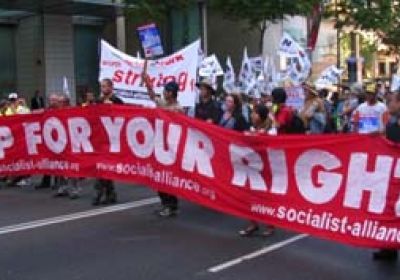 Union activist Chris White has worked for several unions and for 17 years was assistant secretary, and then secretary, of the United Trades and Labor Council of South Australia. The article below is based on a speech he gave at a fringe event during the recent Australian Council of Trade Unions (ACTU) Congress. * * * Unionists need to organise for the right to strike, for the effective strike and for workers’ control.
Union activist Chris White has worked for several unions and for 17 years was assistant secretary, and then secretary, of the United Trades and Labor Council of South Australia. The article below is based on a speech he gave at a fringe event during the recent Australian Council of Trade Unions (ACTU) Congress. * * * Unionists need to organise for the right to strike, for the effective strike and for workers’ control. -
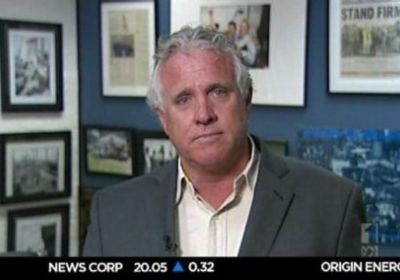 The Maritime Union of Australia (MUA) has accused the federal government of unfairly targeting waterfront workers as part of a so-called crackdown on organised crime. Home Affairs minister Jason Clare said on May 25 that federal police would be given new powers to put waterfront workers out of a job if they have a criminal record or are suspected of involvement in organised crime.
The Maritime Union of Australia (MUA) has accused the federal government of unfairly targeting waterfront workers as part of a so-called crackdown on organised crime. Home Affairs minister Jason Clare said on May 25 that federal police would be given new powers to put waterfront workers out of a job if they have a criminal record or are suspected of involvement in organised crime. -
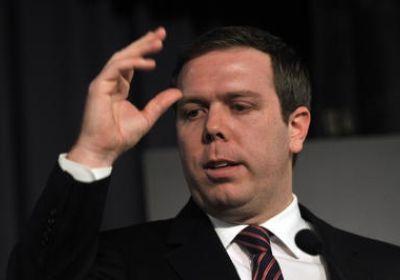 Election pundit Peter "Mumble" Brent has accurately summed up Paul Howes as “not so much a person as an ever-evolving script”. He became chief of the right-wing run Australian Workers Union five years ago but clearly has much higher political ambitions.
Election pundit Peter "Mumble" Brent has accurately summed up Paul Howes as “not so much a person as an ever-evolving script”. He became chief of the right-wing run Australian Workers Union five years ago but clearly has much higher political ambitions. -
Qantas cuts 500 more jobs Qantas said on May 21 it would axe more than 500 engineering jobs from Tullamarine and Avalon in Victoria. Qantas said: “Further changes to Avalon are expected as the business continues to modernise.” Qantas CEO Alan Joyce said the company had to cut maintenance costs to match its competitors, and that newer aircraft “require less maintenance, less often”.
-
About 4000 unionists at six coal mines in Central Queensland have struck for a week from May 24 after enterprise bargaining talks with employers BHP Billiton and Mitsubishi again broke down. The 18-month-long dispute between the Construction Forestry Mining Energy Union (CFMEU) and mineowners the BHP-Billiton Mitsubishi Alliance (BMA) centres on a push by the company to replace union-appointed mine safety officers with management officials.
-
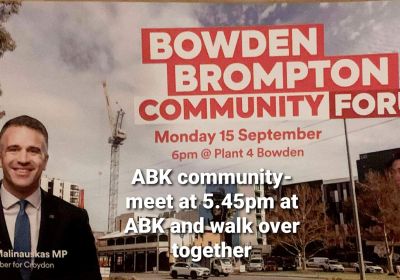
The Sydney Al-Nakba rally and march - marking 64 years since the brutal dispossession of Palestinians from their homeland - was successful despite police attempts to derail it.
-
Tens of thousands of NSW teachers stopped work for two hours on May 18 to protest against the Barry O’Farrell state government’s cuts to public education. Using the smokescreen of “increasing school autonomy”, the government plans to radically cut funding and resources for public schools through its Local Schools Local Decisions policy. Many teacher meetings across NSW reported the largest turnouts in recent times and unanimous votes for escalating industrial action if the O’Farrell government refuses to halt its cost-cutting agenda.
Workers & unions
Workers & unions